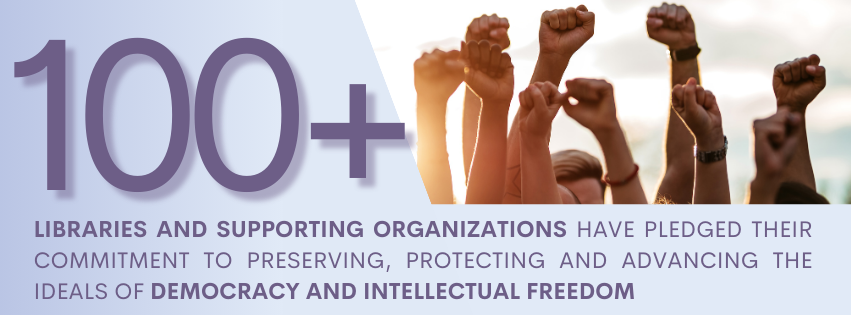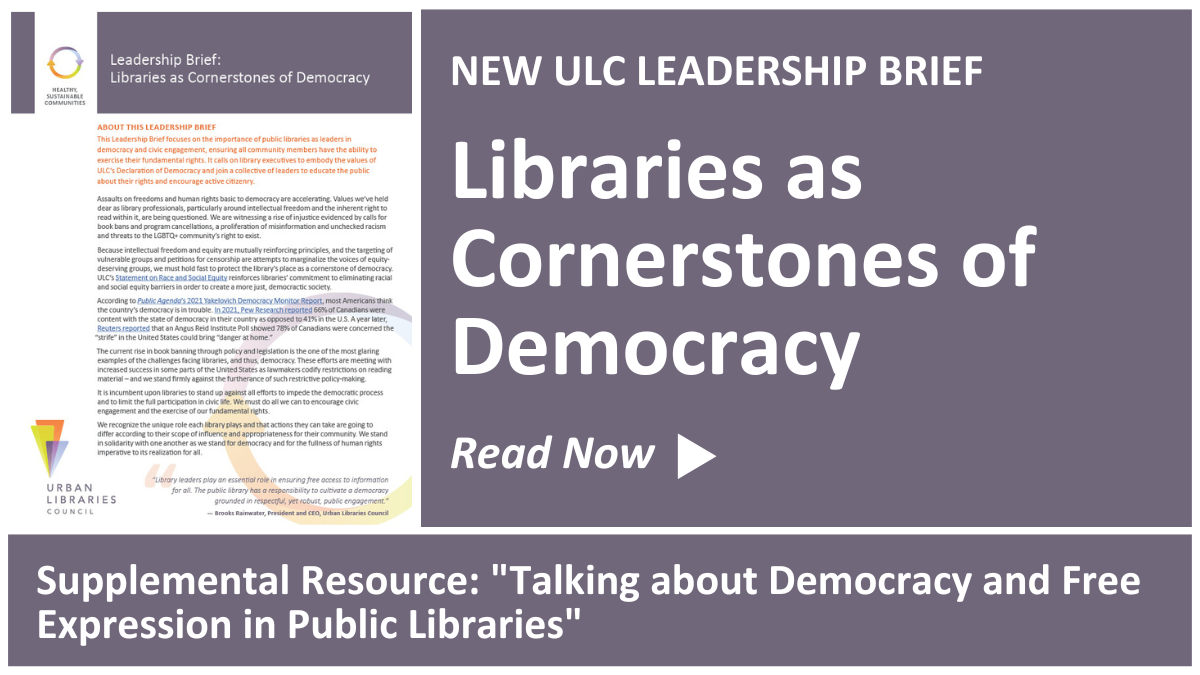ULC Declaration of Democracy

Public libraries are critical cornerstones of democracy, and democracy’s future is diminished when people’s access to power, information, a diversity of voices and the ability to influence policy are restricted. The battle to protect democracy is a global struggle playing out at the local level and libraries have landed on the front lines. Democracy can only thrive with strong community-level support and engagement. As leaders of North America’s urban public libraries, we must commit to preserving, protecting and advancing the highest hopes and ideals of democracy so all members of our communities may fully participate in the democratic process.
This declaration provides a baseline for building policies and actions that preserve and protect democracy in our communities. The declaration reads as follows:
Democracy is under siege throughout the world and close to home. Daily, we witness assaults on basic freedoms and human rights we’ve long cherished as books are banned, programs and events are canceled, disinformation and misinformation spread unchecked and racism is institutionalized. Democracy’s future is diminished when people’s access to power, information, a diversity of voices and the ability to influence policy are restricted. As cornerstones of democracy, it is incumbent upon libraries to stand up against all efforts to impede the democratic process and limit the full participation in civic life.
Banning books through policy and legislation is one such example of the challenges facing us. These efforts have unfortunately met with success in some parts of the United States as lawmakers codify restrictions on reading material – and we strongly stand against the furtherance of such restrictive policymaking.
As leaders of North America’s public libraries, we are committed to preserving, protecting and advancing the highest hopes and ideals of democracy so all members of our communities may fully participate in the democratic process. To meaningfully participate in society, people need access to a broad range of information and ideas, as well as opportunities for open, uncensored discourse to hear, read, debate and learn from each other’s perspectives.
It is for this reason that libraries as trusted institutions in their communities join to advance this Declaration and commit to the following:
- Educating and informing the public about the rights afforded to them in the United States Constitution and the Canadian Charter of Rights and Freedoms, among them the freedom of religion, thought, speech, expression, belief, the press, peaceful assembly and association.1
- Encouraging an active citizenry where all are engaged in creating an equitable and just society where everyone may realize their potential as individuals within the community.
- Serving as a convener for and facilitator of civic engagement and civil discourse, where all voices may be heard and respect is displayed for community members’ diverse opinions, thoughts, histories and cultural heritage.
- Increasing efforts to fight misinformation and disinformation, providing reliable resources and seeking new ways to help patrons find verifiable and accurate information.
- Leveraging programming, collections and other resources to promote human dignity, open dialogue and respect for diverse viewpoints, civil rights, and all other protections and freedoms fundamental to democracies, and based on the conviction that “laws and institutions must go hand in hand with the progress of the human mind”2, holding fast to the expectation that “the arc of the moral universe is long, but it bends toward justice”3, and that “the Just Society will be one in which the rights of minorities will be safe from the whims of intolerant majorities.”4
We resolve to continue to create spaces where entering our doors is an act of participating in democracy, where people can read and learn freely from all points of view, make up their own minds and engage in their communities. We stand as proud leaders of libraries, and as such, we will continue to guard democracy’s great promise and ensure all those we serve are included in its fulfillment.
1 See First Amendment in the United States Constitution and Section 2 in the Canadian Charter of Rights and Freedoms.
2 Thomas Jefferson, from a letter to Samuel Kercheval, July 12, 1816, enshrined on Southeast Portico of the Jefferson Memorial, Washington, D.C.
3 Martin Luther King, Jr., Washington National Cathedral, March 31, 1968, enshrined on South Wall of the Martin Luther King, Jr. Memorial, Washington, D.C.
4 Pierre Elliott Trudeau, as cited in The Essential Trudeau, ed. Ron Graham. (pp.16 – 20).
To add your library's signature to ULC's Declaration of Democracy, please click below. (U.S. & Canada)

To indicate your organization's support for this effort, please click below.

The following U.S. and Canadian libraries have signed on to the above declaration:
Alaska
Arizona
Arkansas
California
District of Columbia
Florida
Georgia
Louisiana
Massachusetts
Maryland
Michigan
Nebraska
Oklahoma
Ontario
Oregon
Pennsylvania
Tennessee
Washington
Wyoming
The following organizations and libraries support the above declaration:
United States
Bulgaria
Italy
We are proud to launch this vital initiative and invite all ULC member libraries to join us in our commitment to preserving democracy in our communities. Library leaders serve as civic educators and play an essential role in taking on censorship and ensuring free access to information for all. The public library has a responsibility to cultivate a democracy grounded in respectful, yet robust, public engagement.
Brooks Rainwater, ULC President and CEO
Leadership Brief: Libraries as Cornerstones of Democracy
Informed by the work of ULC's Democracy Advocacy Group, this Leadership Brief highlights the core areas libraries can focus on to increase their reach in promoting a more democratic community, as outlined in the Declaration of Democracy. It also spotlights the work of eight exemplary ULC member libraries in the U.S. and Canada that empower their patrons through various programs and services.
A supplemental resource, Frequently Asked Questions and Commonly Used Phrases: Talking About Democracy and Free Expression in Public Libraries, offers answers to frequently asked questions and explanations of commonly used phrases when discussing the library’s role as a cornerstone of democracy.

